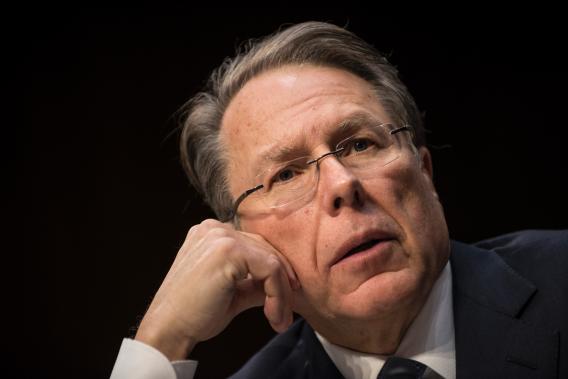Wayne LaPierre understands the power of dystopia. For the National Rifle Association’s CEO, that dystopia—or more specifically, the fear that it conjures—is the stuff that grows membership, funding, and influence. And for much of his 22-year tenure leading the NRA, he has conjured those fears with the help of a familiar enemy: the U.S. government.
The NRA has long argued that American citizens needed to be armed to fend off some future American dictatorship that would one day “come for the guns.” Charlton Heston wasn’t subtle in his “cold dead hands” pledge in 2000. In 1995, LaPierre called federal employees “jack-booted government thugs” and claimed that they were “wearing Nazi bucket helmets and black storm trooper uniforms to attack law-abiding citizens.” Or, if it wasn’t Uncle Sam knocking down doors, it would be some other totalitarian government. While most of us saw Red Dawn as a cheap action flick, LaPierre saw a possible future, saying there “was nothing unrealistic in that dramatization” of Cubans seizing our guns. “It can happen here,” he warned.
But that is yesterday’s dystopia. In a sense, LaPierre’s argument fell victim to the NRA’s own success. It’s hard to argue that the federal government is coming to seize your guns when that same government is working overtime to enshrine the power of the Second Amendment. During the Bush administration, Attorney General John Ashcroft pushed for an expanded interpretation of the Second Amendment, and the White House helped push through special protections for the gun industry. As George W. Bush’s administration furthered an ardent pro-gun agenda in sync with the NRA’s position, LaPierre had to find a new strategy.
So today, LaPierre isn’t spending so much time warning of an overweening, tyrannical federal government; he is more interested in social collapse. The shift can be dated to late 2005, specifically the aftermath of Hurricane Katrina. In the 1990s, LaPierre had noted the role “armed citizens played in stabilizing a community against the crime and looting that followed in the wake of Hurricane Andrew that same year.” But it was subtheme, never a drumbeat. After all, with President Clinton pushing for monumental gun violence laws, including the Assault Weapons Ban and the Brady Bill, LaPierre’s specter of federal government had some purchase.
After Katrina, the “fear of social collapse” argument moved to center stage. A pamphlet invoked Katrina to warn that you can be “reduced to the final and purest form of self-reliance in the face of terrifying anarchy.” The dystopia LaPierre has been peddling since then is less an all-powerful U.S. government than a government that is helpless to protect you.
LaPierre’s pivot was on full display in an article he wrote last week for the Daily Caller. After describing the “hellish world” left in Hurricane Sandy’s wake, he goes on to catalog his fears: “Hurricanes. Tornadoes. Riots. Terrorists. Gangs. Lone Criminals. These are perils we are sure to face—not just maybe.” But the full conversion comes five paragraphs later, when he writes: “Gun owners are not buying firearms because they anticipate a confrontation with the government. Rather, we anticipate confrontations where the government isn’t there—or simply doesn’t show up in time.” Forget totalitarianism. Now we need to fear total anarchy.
Of course, LaPierre has a fully loaded plan. His 2011 book, Safe: How To Protect Yourself, Your Family, and Your Home, was reviewed by Publishers Weekly as a “useful addition to anyone’s Go Bag.” Moving away from a focus on its own merchandise, in 2011 the NRA began selling an entire line of “Survivor Gear” designed to equip you for catastrophe. For $139.95 you can buy an NRA machete designed to give you “force for chopping and a naturally relaxed wrist position for thrusting.” In keeping with the “prepper” craze, the NRA is trying to position itself as preparing citizens for catastrophes when you cannot rely on government.
Even after the Newtown, Conn., school shooting, LaPierre doubled down on his disaster preparedness message. In a little-noticed line from his initial news conference after Newtown, he warned that a “hurricane, terrorist attack, or some other natural or man-made disaster” could set the stage “for a national nightmare of violence and victimization.” At his testimony at the Senate Judiciary Committee in January, he distanced himself from his older anti-government line and argued that guns are “relevant and essential to “fundamental human survival” because “if a tornado hits, a hurricane hits, if a riot occurs” then people “are going to be out there alone, and the only way they are going to protect themselves in the cold, in the dark, is with a firearm.”
In the end, LaPierre doesn’t really care which dystopia he is selling. Until Congress appears poised to pass gun-control legislation with even a hint of seriousness, LaPierre will still be looking on the horizon for the next storm front that will return us to a lawless state of nature. A few years ago he had the same fervor when he hyped fears that the Holocaust could happen in the United States. Regardless of the apocalyptic scenario, LaPierre always has the same answer: more guns.
